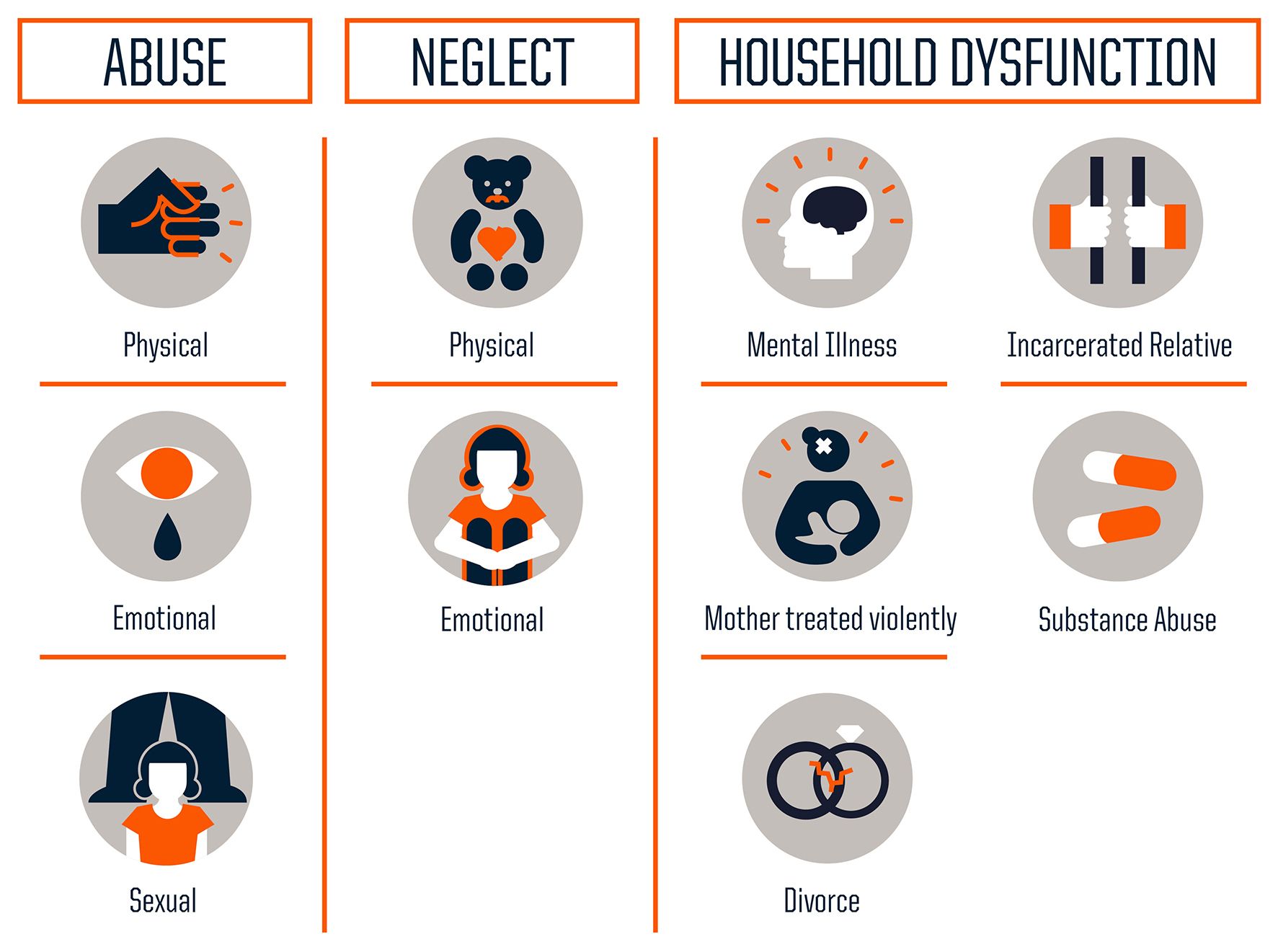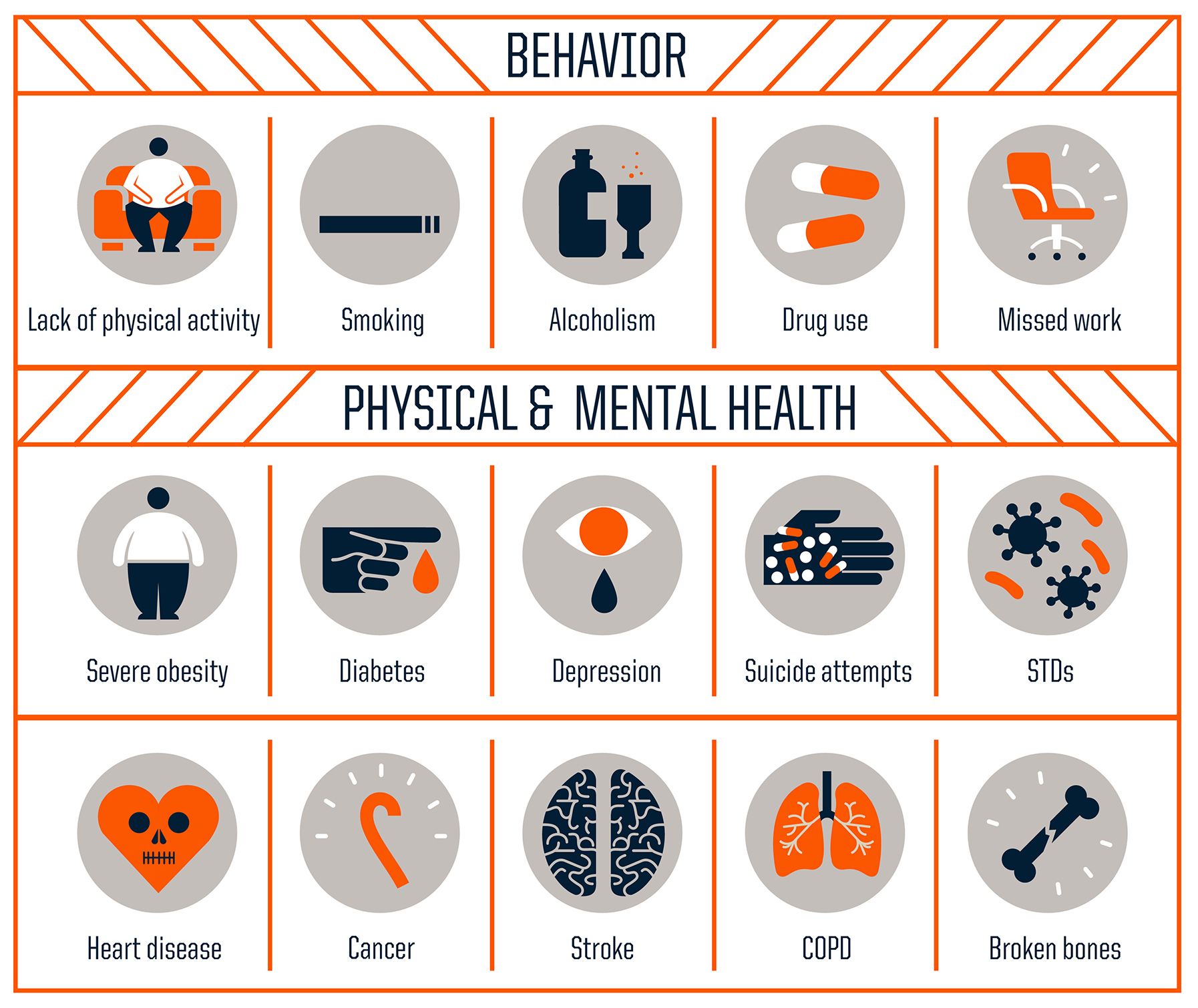What Are Adverse Childhood Experiences?
Adverse Childhood Experiences or ACEs happen to about at least two-thirds of us growing up (figure 1). They can be grouped into three categories: abuse, neglect and dysfunction, as you can see in figure 2. These experiences have a variety of serious long-term consequences, not just for our relationships but also for our health. Some of these are shown in figure 3.

Why ACEs cause as much trouble as they do is still being actively researched. It's not too hard to see why bad things impact our relationships, but why do they cause so much physical damage, too? It come down to three things: chronic long term stress, self-destructive coping habits and the way our genes are turned on and off by especially by early traumatic experiences.

Effects of Chronic Long-Term Stress
The main long-term stress hormone that is known to cause problems is cortisol. Cortisol normally helps turn different processes in our bodies up and down to prepare for "fight or flight." In the short run this is good. If we stay stressed or are frequently and intensely being triggered, this can have several serious negative consequences including: immune system problems leading to autoimmune diseases, diabetes, and cancer, high blood pressure and heart disease, the shrinking of some parts of the brain and others show in figure 3.

Self-Destructive Coping Habits
Self-destructive coping habits may be the most important source of health problems. Drinking, drugs, smoking and comfort eating all provide short term relief from our problems but damage our organs over the long haul. Sometimes this is by "wearing them out" prematurely and sometimes it's by promoting cancer or other diseases.
Drugs and alcohol in particular also cause a variety of relationship or social problems, too. These can include economic problems, job loss, relationship loss, accidental injuries or death and incarceration. Domestic violence most often happens when someone is drunk or high. All of these play a role in passing ACEs down to the next generation as well.
Gene Expression and Regulation
We have a fascinating system for controlling how genes are turned on and off in our bodies. When we are exposed to a variety of more or less extreme conditions, especially in our earliest years, genes are switched to help us cope as best we can with what is likely to be a long term or lifelong problem. This sometimes causes or contributes to health problems like diabetes and Alzheimer's later in life.
Gene regulation changes can also lead to a predisposition for anxiety and depression. There is also growing evidence that some of these changes can be passed on to your children (or that you may have inherited them from your parents).
ACEs and Understanding Yourself
If you have an ACE score of 3 or 4 or more, you need to take the time to learn more about ACEs. It's very easy to underestimate or ignore their impact. They can easily seem "not so bad" or "no big deal," but they really are. They undoubtedly color and impact all of your relationships. Sometimes that is obvious and other times it's not.
If you have bad coping habits: drinking or other substance abuse, smoking, comfort eating, acting out or withdrawing, now you have a better understanding of why. We've already noted that these are major contributors to problems with our physical and emotional health. They may ease our discomfort now, but they are setting us up for big, and sometimes deadly, problems down the road.
Developing and maintain healthy habits, especially around diet, exercise and stress does start to reverse the adverse consequences at least partially.
You really can make your life happy and whole. You can learn to see yourself as more than just a survivor. You can stop living a compartmentalized life. Learning to do this will reduce stress and help you be heathier all by itself.
You can learn to trust a little more and as Martha Londigan says, "learn to let people love you." You can improve your self-compassion and self-care, become less angry, anxious or depressed as you learn to cope with and face the unpleasant feelings and events of your life and move through them instead.
ACEs and Understanding Others
If you are in a relationship with someone with 3 or more ACEs, you really need to recognize the impact it has had on them. Think about your parents and the older generations of your family, too. If you have started to recognize the impact of ACEs on yourself, try to imagine the impact theirs had on them. See if you can find empathy, compassion and perhaps a measure or two of forgiveness for them.
Please remember forgiveness doesn't mean whatever happened didn't hurt, doesn't count or no longer matters. It simply means you've started to let it go and can start to move on. It also doesn't mean you have to like, hang out with or be in an active relationship with the other person. Sometimes keeping a healthy distance with business-like politeness is the best we can do until more healing takes place on both sides.
Healing and Changing Your Family Legacy
How much impact trauma has on us varies for several reasons: our individual physical makeup, how early in life it happens, how frequently and intensely it happens and for how long it goes on. This certainly affects how long it might take and how much work needs to be put into healing.
Traumatic events that happened very early in our lives usually take the most work to heal from. This happens because we may have no memory of some of the events, and we have no words for them. We only know that we are reacting to something. Early trauma also tends to do the most to wire our brains for survival which tends to keep us on the alert.
Traumas that happen somewhat later in life can still have enormous impacts on us, but we've had the opportunity to develop enough physically, mentally and socially that we can often recover more quickly and completely.
Whatever ACEs you've experienced and whatever traumas you've experienced since, there are several strategies to use to start healing. Getting professional help through counseling may be important if you know you are really struggling. Recovery groups can also be a tremendous source, not only of information and life strategies, but of connection with people you can relate to. AA, NA and Celebrate Recovery all have groups nearby.
You can also work on healing at home through things like journaling, focusing, meditation, progressive relaxation and developing self-compassion. A variety of self-help books can help you understand yourself and others better. A few are listed in the resources section below.
If you are worried about the impact your life has had on your kids, and the ACEs they may have already received, you need to know that having you work through your own healing in front of them and demonstrating growth and change for them is a great way to start to change that. They can also benefit from the same things that can help you when they are re-geared for children or adolescents. Just having one in-progress, becoming healthy, interested and invested parent makes all the difference in the world and the research proves it.
Videos
APB Speakers, How Childhood Trauma Can Make You a Sick Adult (Vincent Felitti)
Pam Wessel-Estes, Personal and Parental Reflections on Adverse Childhood Experiences
Dr. Joan Rosenberg, Emotional Mastery: The Gifted Wisdom of Unpleasant Feelings (TEDxSantaBarbara)
Martha Londagin, Adverse Childhood Experiences Can Be Connectors to Joy (TEDxDicksonStreet)
Gerry Valentine, Embrace Adversity (TEDxBoulder)
Dr. Brené Brown, Listening to Shame (TED)
Dr. Brené Brown, The Power of Vulnerability (TED)
Resources
Matthew McKay, PhD; Patrick Fannin; Avigail Lev, PsyD and Michelle Skeen, PsyD, The Interpersonal Problems Workbook: ACT to End Painful Relationship Patterns (2013)
Bessel van der Kolk, MD, The Body Keeps the Score: Brain, Mind, and Body in the Healing of Trauma, 1st Edition (2014)
Nadine Burke Harris, The Deepest Well: Healing the Long-Term Effects of Childhood Adversity (2018)
Donna Jackson Nakazawa, Childhood Disrupted: How Your Biography Becomes Your Biology, and How You Can Heal (2015)
Bruce D. Perry, MD, PhD. and Maia Szalavitz, The Boy Who Was Raised as a Dog: And Other Stories from a Child Psychiatrist's Notebook – What Traumatized Children Can Teach Us About Loss, Love, and Healing (2017)
Quote for the Week
Eric Greitens
There is a lot of evidence to suggest that the children who are most likely and most willing to take risks are those who know that they can return to loving parents and a secure home…. Resilience – the willingness and ability to endure hardship and become better by it – is a habit that sinks its roots in the soil of security. The child who is always protected from harm will never be resilient. At the same time, the child who is never loved will rarely be resilient.
Verses for the Week
James 1:2-3
2Dear brothers and sisters, when troubles of any kind come your way, consider it an opportunity for great joy. 3For you know that when your faith is tested, your endurance has a chance to grow.
Philippians 4:13
I can do all things through him who strengthens me.
Psalm 23
1The LORD is my shepherd; I have everything I need.
2He lets me rest in fields of green grass and leads me to quiet pools of fresh water.
3He gives me new strength. He guides me in the right paths,
as he has promised.
4Even if I go through the deepest darkness, I will not be afraid, LORD,
for you are with me. Your shepherd's rod and staff protect me.
5You prepare a banquet for me, where all my enemies can see me;
you welcome me as an honored guest and fill my cup to the brim.
6I know that your goodness and love will be with me all my life;
and your house will be my home as long as I live.
Prayer for the Week
Help me this week to begin to get a clearer appreciation of the impact adverse experiences have had on me and on those I care about. I want to develop empathy and compassion for myself and others as I start to heal myself. I don't want to run any more. I want to make a difference for the future. Amen.

